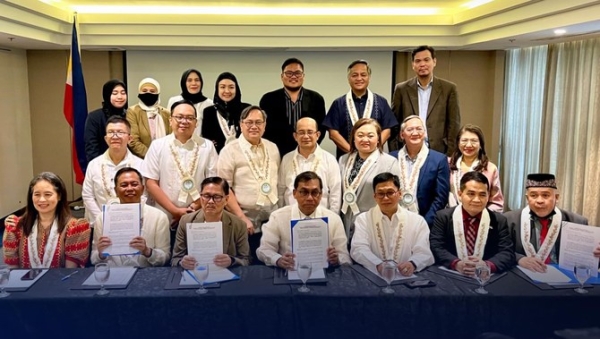MANILA: The National Commission on Muslim Filipinos has joined hands with the Department of Science and Technology to improve the production and competitiveness of the halal industry in the Philippines.
There are only some 10 million Muslims among the nearly 120 million, predominantly Catholic population of the Philippines, but the country has set big targets to expand its domestic halal industry.
The government plans to raise 230 billion pesos ($4 billion) in investments and generate about 120,000 jobs in the next four to five years in the hopes of tapping into the global halal market, which is estimated to be worth more than $7 trillion.
Cooperation between the science department and NCMF is part of the efforts, which also include other government agencies such as the Department of Trade and Department of Agriculture.
“This strategic alliance, fortified by a shared vision for progress and inclusivity, unfolds several promising benefits poised to transform the landscape of halal certification and cultural preservation in the nation,” NCMF spokesperson Yusoph Mando told Arab News on Friday.
The NCMF and DOST signed an agreement on Thursday on the establishment of DOST’s halal verification laboratories.
Government data shows that the Philippines has 1,835 of its own halal-certified products and while some are already exported, the country still needs to develop its halal branding to enter the global market.
For Mando, the establishment of verification facilities “demonstrates a commitment to ensuring the integrity” of halal production.
“This collaboration can significantly bolster the halal industry in the Philippines by providing accurate and reliable methods to verify halal certification, thereby increasing consumer confidence and facilitating market growth for halal products,” he said.
“The joint effort facilitates the integration of scientific advancements into halal certification processes. The use of technology and scientific expertise from DOST can refine testing methods, such as detecting porcine DNA and alcohol levels in food and beverages, aligning them with halal requirements.”
The partnership will benefit not only Philippine halal exports, but also the country’s own Muslim minority, encouraging a respect for Islamic dietary preferences and cultural practices.
“A robust and reliable halal certification system contributes to economic growth by expanding markets for halal products, both domestically and internationally,” Mando said.
“This collaboration signifies a step forward in aligning scientific advancements with cultural and religious considerations, benefiting the halal industry, empowering Muslim communities and demonstrating the government’s commitment to inclusive development.”

 En
En  Fa
Fa 

